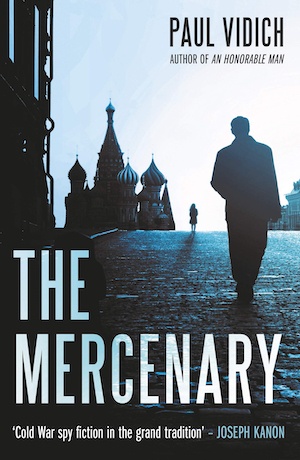
The Mercenary is the fourth novel in Paul Vidich’s Cold War espionage series featuring CIA officer George Mueller, which began with An Honorable Man in 2016. Vidich appears to be following the lead of his illustrious predecessor in that, like John le Carré’s George Smiley, Mueller is not the focus of every novel in which he appears. The Mercenary opens with him as chief of the Moscow Station in December 1984, aged 63 and desperate to avoid mandatory retirement. His mission is to facilitate the defection of a high-ranking KGB officer known by the codename GAMBIT, who is subsequently revealed to be Lieutenant Colonel Viktor Petrov. Their meeting in Red Square is foiled by the KGB and although Petrov escapes undetected, Mueller is arrested and expelled. He does not return to centre stage until the conclusion of the novel, which is set in 1992 and finds him Acting Director of the CIA.
The remaining 27 chapters focus on our protagonist, The Mercenary, who may or may not be named Aleksander Garin, may or may not be a Soviet émigré, and may or may not be a double agent. What little is known about Garin is that he is in his early 40s, about to be divorced, used to be a CIA intelligence officer, and is now a contract agent. His dismissal from the CIA followed a failed attempt to exfiltrate KGB General Zyuganov from the USSR six years ago, but Petrov has specifically asked for him as his handler and Garin is recruited to complete Mueller’s work.
Garin joins the US embassy in Moscow, adopting the persona of a sullen and solitary civil servant whose career has plateaued. The first complication arises immediately before his initial meeting with Petrov, when he encounters a woman named Natalya in Vvedenskoye Cemetery. Natalya is Zuganov’s daughter and makes conspicuous attempts to spend time with Garin for motives that are as opaque as his own. Is she spying for the KGB, assisting Petrov or wanting to defect? Petrov has evidence that his superior in the KGB, Dmitry Posner, suspects him of treason, which makes the exfiltration all the more urgent and raises the stakes for Garin when he realises that Natalya and Posner are well acquainted. He does not know what to make of her: “Something is off. She seems too untrained. Too indecisive. Too naïve. She may be a sparrow, or a sparrow in training. They may be using her to see what she can do.”
The plot takes its first twist when Mueller tells Garin to continue with the mission despite the likelihood that he has been compromised, in order to find out exactly how much the KGB know. The new station chief, John Rositske, does not trust Garin and suspects he may have been a double agent all along. This suspicion becomes a possibility when Garin is arrested and recruited by Posner. Posner knows that Garin is in Moscow to exfiltrate a high-ranking KGB officer, does not know the traitor’s identity, but wants Garin to succeed so that he can oust one of his rivals, Lieutenant Colonel Viktor Talinov. Garin agrees, his motives once again opaque.
This is a slow-burning espionage thriller in which the suspense is generated by a parallel pair of questions: will Garin’s mission succeed and for whom is he ultimately working? One could also add the question of who Garin actually is, although this is never answered in full – a confident and masterful touch by Vidich. The action sequences are sudden and deadly when they occur, understated but realistic representations of skirmishing in the shadows. While having dinner at the Bolshoi Theatre, Garin discusses Hemingway, Tolstoy, and Le Carré with Natalya, a revealing choice. According to Vidich’s blog, the series is intended to contribute to the genre of ‘Cold War literary fiction’ and this is an accurate assessment of the merit, value and significance at which The Mercenary aims.
The novel is clearly written in the style of Le Carré, with Mueller as an American Smiley and Garin his spy coming in from the cold. The problem is that if you have read and loved Le Carré, then you may be disappointed by The Mercenary because it doesn’t quite reach that high standard. Vidich’s most obvious failing is his descriptive prose, which is very sparse and – like Hemingway at his most terse – leaves too much to the imagination. The technique works well for the action sequences, but makes it difficult to care about the characters and without that concern, it is harder to sustain interest through to the end.
Also see our review of The Coldest Warrior by the same author.
No Exit Press
Print/Kindle/iBook
£8.19
CFL Rating: 3 Stars











The first book I’ve read by Vidich, and I’m glad to have discovered him. Yes, a variation of The Spy Who Came In From The Cold, but very well done. I really liked his “terse” writing style. I plan to read his other books.